牛津高中英语 M4U1 Grammar
牛津译林版高中英语必修模块四 4Unit1 Grammar教案-新版

牛津版必修4Unit1 Grammar教案Analysis of the teaching material:This is the 5&6th period of Unit One. In this period we’ll deal with direct speech and reported speech.Objectives:1.Help Ss understand how to use reported speech in statements, questions andimperative sentences.2.Help Ss learn the way to change direct speech into reported speech in differenttenses and sentence structures.Teaching important point:How to help the students apply these rules into practiceTeaching approaches:Teaching approaches is the key step for class teaching. Visual-scene teaching method, tasked-based method as well as the approaches of discussion and so on will be adopted in the teaching process of this lesson. Emphasis will be put on Ss’ ability of speaking, expressing and brainstorming. Language is best learned through activities. I’ll introduce a rich variety of activities and approaches to meet different needs of the Ss and make full use of the advantages of multimedia which is visual, operable to make my lesson vivid, interesting and effective.Interaction Patterns: Teachers -class, individuals, pairsSs’ ability to work both independently and together is very important to their success in the future. It is therefore important for Ss to have opportunities to develop their English skills and knowledge independently, in pairs, in groups and as a class. Teaching Aids: multimedia and a blackboardProcedures for teaching:Step 1 Revision and Lead-inMake a dialogue with some Ss to introduce the topic.Step 2 Direct speech and reported speech1. What should we pay attention to when changing direct speech into indirect speech?(1) Personal pronouns and tense(2) Adverbials of time and place(3) Other cases2. Have Ss do the Ex:Change the following sentences into reported speech.3. Ask Ss to finish the Ex. on Page 9.Step 3 How to use reported speech to report1.Statements:After explanation, ask Ss to do some simple questions at once.2.Questions:Have Ss try some easy tasks after explaining.3.imperative sentences:Help Ss finish several exercises after imparting.Step 4 Ex. for consolidation1.Ask Ss to finish A on Page 11.2.Help Ss to finish B on Page 11.Homework1. P92: C1&C22. Unit Revision: Periods 5 & 6.。
牛津英语M4U1Grammar

Period 41.The teacher said that the earth moves around the sun.2.He said to me that I would pass the exam the next day.3.I said to her what she was doing then.4.Betty asked me if / whether I had seen the teacher.5.He said how happy he was.6.The doctor asked / ordered / advised me not to smoke.7.She asked me what I wanted. 8.He asked her whether she was fond of sports or reading.9.He asked me to sit down. 10.He said that he went there in 1998.①He says that that work is too difficult.②He said that there are over 50,000 different characters in Chinese.③The boy said that he is fifteen. ④I said that you’d better ask him for help.⑤He said that he gets up at six o’clock every morning.⑥He said that when he lived in America, he often saw Tom.⑦My friend said that he was born in 1982.⑧She said that she had lived in a small village before he came here.(1) He asked me if / whether I was ready. (2)He asked me what I said.(3) He asked me whether they were teachers or students.1. C2.D3.D4.B5.C6.B。
M4U1 Grammar and usage牛津高中英语模块四Unit1 直接引语和间接引语语法详解

Amy said that she was going to
travel to Beijing with her parents.
direct speech ◆To report wrted speech
◆To report what has been said without using the exact words ◆The words usually appear in quotation ◆No quotation marks marks
the instructions which control what a computer does; computer programs software n. 软件 a useful piece of information, esp. about how to do sth. or about the likely winner of a race or competition; the usually pointed end of sth., esp. sth. which is long and thin; a small amount of money given to someone who has provided you with a service, in addition to the official payment and for their personal use tip n. 建议,提示;顶端,末梢;小费
How to change direct speech into reported speech
1. Use an object clause or an infinitive phrase
He said, „I‟m used to such embarrassing comments.‟ He said that he was used to such embarrassing comments. „We must not give up in the face of pressure!‟ she said. She encouraged us not to give up in the face of pressure.
牛津译林版高中英语必修四模块4Unit1课件Grammarandusage

Janetoldhimthatshehadreadthebookthere aweekbefore.
Directspeech
Reportedspeech
today tomorrow yesterday
theday/yesterday/onMonday,etc. thenextday/thefollowingday/onFriday,etc thedaybefore/thepreviousday/onTuesday,etc
Imperativesentences:
*Toreportimperativesentences,weusethestructure:repor tingverb+object+(not)+to-infinitive.
‘Don’tworry,Mickey,’Jensaid.
JenaskedMickeynottoworry.
Myfathertoldmethathewasreadingthebook.
Whatshouldwepayattentionto?
1personalpronounsandtense learnmorea 2adverbialsoftimeandplace boutit e.g:Hesaid,‘Ilostakeyhereyesterday.’ Hesaidthathehadlostakeytheretheday before/thepreviousday. Ex.‘Ireadthebookhereaweekago.’Janesaidto him.
牛津译林版高中英语必修模块四 Unit1 Grammar and Usage教案2-新版
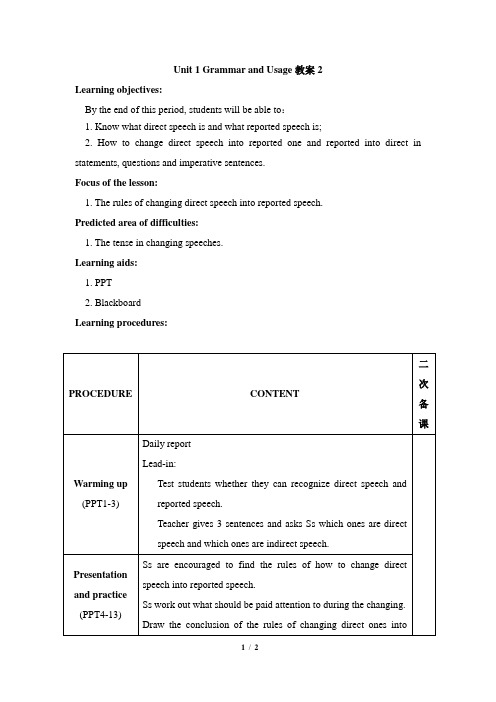
(PPT4-13)
Ss are encouraged to find the rules of how to change direct speech into reported speech.
on to during the changing.
Unit 1 Grammar and Usage教案2
Learning objectives:
By the end of this period, students will be able to:
1. Know what direct speech is and what reported speech is;
Daily report
Lead-in:
Test students whether they can recognize direct speech and reported speech.
Teacher gives 3 sentences and asks Ss which ones are direct speech and which ones are indirect speech.
2. How to change direct speech into reported one and reported into direct in statements, questions and imperative sentences.
Focus of the lesson:
1. The rules of changing direct speech into reported speech.
(PPT14-20)
Give examples of changing direct speech into reported speech in three sentence types.
牛津高中英语模块一unit1_Grammar
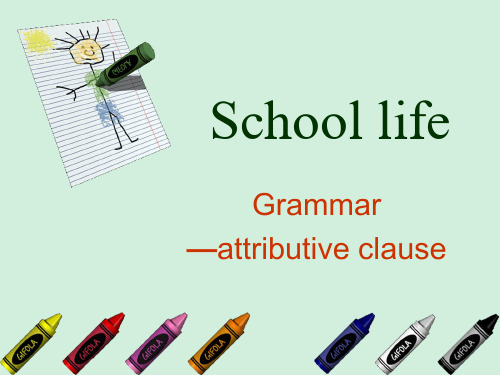
3. which 指物,作主语或宾语 (作宾语可省略, 如介词提前则不能省)
These are the trees which were planted last year.
定语从句引导词
关系代词 所指代(即先行词) 在定语从句中所作 句子成分
who
人
主语,宾语
whom 人
宾语
which 物
主语,宾语
that
人/物
主语,宾语,表语
whose as
所有格 人/物
定语 主语,宾语,表语
关系代词的用法(在定语从句中)
1. who指人,作主语或宾语 (作宾语可省略) The man who I talked with is our teacher. A person who steals things is called a thief. 2. whom指人,作宾语 (作宾语可省略,如介词提前
iv. 先行词既有人又有物,宜用that Do you know the things and persons that they are talking about?
v. 先行词是all, much, little, something, everything, anything, nothing, none, the one 等不定代词时 You should hand in all that you have. We haven’t got much that we can offer you. I mean the one that you talked about just now.
最新牛津高中英语模块一Unit+1+Grammar+定语从句讲解学习资料

英语单词词性缩写
❖art =article 冠词的缩写 ❖num =numeral 数词的缩写 ❖int = interjection感叹词,的缩写 ❖U= uncountable noun不可数名词的缩写 ❖c = countable noun可数名词的缩写 ❖pl =plural 复数的缩写 ❖int. 语气词 ❖abbr. 缩写词
牛津高中英语模块一 Unit+1+Grammar+定语
从句讲解
英语单词词性缩写
❖prep = preposition 介词 ❖pron =pronoun 代名词,也可叫代词 ❖n =noun 名词 ❖v = verb动词,兼指及物动词和不及物动词 ❖conj = conjunction连接词,也叫连词 ❖vi = intransitive verb不及物动词的缩写 ❖vt = transitive verb及物动词的缩写 ❖aux.v = auxiliary助动词的缩写 ❖adj = 形容词,adjective的缩写 ,也有写成 a ❖ adv=adverb的副词的缩写,也有写成ad
Company Logo
英语基本句型
❖主语+系动词+表语 The boy looks healthy. (那个男孩看起来很健康)
❖ 主语+及物动词+宾语+宾语补足语 What made you angry. (什么是你生气)
Company Logo
Tips (温馨提示)
❖ 宾语的含义:宾语,又称为受词,指一个动 作的接受者。宾语又分为直接宾语和间接宾语 。直接宾语是动作的直接对象,间接宾语说明 动作的非直接,但受动作的影响的对象。
e.g. Rose is the person(whom/who) you should look after. 萝丝是你应该照顾的人。
M4U1-Grammar

Ⅳ. with, along with, together with, as well as, besides, like, without, except, but, including 主语+这些连接词+其他词时,谓语动词 的数随主语的变化而变化。例如: The teacher, together with his students, planting trees in the street.
表示数量的one and a half 后, 名词要 用复数形式, 但是其短语作主语时,谓 语动词用单数形式。例如: One and a half bananas left on the
table.
The blind in special school. The departed(死者) a well-known engineer.
II .主语的“数”决定谓语动词的形式。 1. 主语为:
– 不可数名词、可数名词单数、单数代词、不定式 (短语)、动名词(短语)或从句时,用单数谓 语形式。e.g.
• ①The work
important . our duty.
• ②To serve the country
• ③How and why he left a sad story . • What he says and what he does not agree.
高考链接
1. As a result of destroying the forests, a large _____ of desert _____ covered the land.(上海2001) A. number; has B. B quantity; has C. number; have D. quantity; have
(完整版)牛津高中英语M4U1语言点(教师版).doc
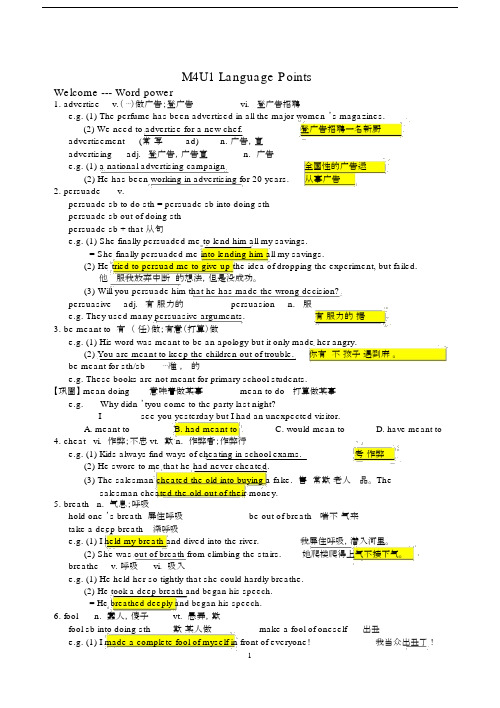
M4U1 Language PointsWelcome --- Word power1. advertise v.(⋯)做广告;登广告vi.登广告招聘e.g. (1) The perfume has been advertised in all the major women ’s magazines.(2) We need to advertise for a new chef.登广告招聘一名新厨advertisement(常写ad)n. 广告,宣advertising adj.登广告,广告宣n. 广告e.g. (1) a national advertising campaign全国性的广告运(2) He has been working in advertising for 20 years.从事广告2. persuade v.persuade sb to do sth = persuade sb into doing sthpersuade sb out of doing sthpersuade sb + that 从句e.g. (1) She finally persuaded me to lend him all my savings.= She finally persuaded me into lending him all my savings.(2)He tried to persuad me to give up the idea of dropping the experiment, but failed.他服我放弃中断的想法,但是没成功。
(3)Will you persuade him that he has made the wrong decision?persuasive adj.有服力的persuasion n. 服e.g. They used many persuasive arguments.有服力的据3.be meant to 有(任)做;有意(打算)做e.g. (1) His word was meant to be an apology but it only made her angry.(2) You are meant to keep the children out of trouble.你有不孩子遇到麻。
译林牛津版高中英语必修四 Unit1 Grammar and usage (共33张PPT)

二随宾
3.Miss Che asked: “Does she like thefilm ?”
三不变
Miss Che asked whether/if she liked the film.
①直接引语里的第一人称,变为间接引语时要和主句的主语保持 一致。
②直接引语里的第二人称,变为间接引语时要和主句的宾语保持 一致。
The changes of personal pronouns时态变化
Simple past (did)
Future in the past (would do)
Past perfect (had done)
Past continuous (was/were
doinge) Past perfect (had done)
like the film ?”
indirect speech
Miss Che asked whether/if she liked the film.
Conlusion3:
Miss Che asked: “Does she like the film ?”
Miss Che asked whether/if she liked the film.
Jack asked Rose to keep her eyes closed.
Jack said to Rose, “(You)Open your eyes.”
(imperative)
Jack asked Rose to open her eyes.
Think: What are the differences ?
Europe.
3.She said “l have never seen the sea” She said that she had never seen the sea.
牛津高中英语M4U1语言点(教师版)(可编辑修改word版)
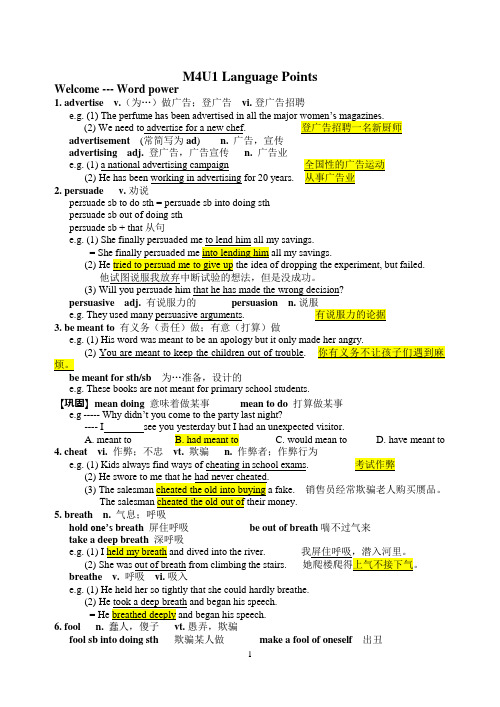
M4U1 Language PointsWelcome --- Word power1.advertise v.(为…)做广告;登广告vi. 登广告招聘(2) We need to advertise for a new chef.advertisement (常简写为ad) n. 广告,宣传advertising adj. 登广告,广告宣传n. 广告业e.g. (1) a national advertising campaign(2) He has been working in advertising for 20 years.2.persuade v. 劝说persuade sb to do sth = persuade sb into doing sthpersuade sb out of doing sthpersuade sb + that 从句(2)他试图说服我放弃中断试验的想法,但是没成功。
(3)Will you persuade him that he has made the wrong decision?persuasive adj. 有说服力的persuasion n.e.g. They used many persuasive arguments.3.be meant to 有义务(责任)做;有意(打算)做(2) You are meant to keep the children out of trouble.为…准备,设计的e.g. These books are not meant for primary school students.【巩固】mean doing 意味着做某事mean to do 打算做某事e.g ----- Why didn’t you come to the party last night?---- I see you yesterday but I had an unexpected visitor.A. meant toB. had meant toC. would mean toD. have meant to4.cheat vi. 作弊;不忠vt. 欺骗n. 作弊者;作弊行为e.g. (1) Kids always find ways of cheating in school exams.(2)(3)销售员经常欺骗老人购买赝品。
牛津译林版高中英语必修四模块四unit1Grammarandusage

Thegeographyteachertoldusthattheearthgoe saroundthesun.
CompletethememoatPage9
Possibleanswers: (1)was(2)wouldn’t(3)hadread (4)that(5)would(6)hadbought (7)that(8)would(9)those (10)Her(11)was (12)wasgoingtoread
reportingverb
object
(not)
to-infinitive
*otherverbscanbeusedinthisstructure adviseencourageinviteremindwarn ‘Don’tbelieveeveryadyouread,’Lilysaidtome. LilyadvisedmenottobelieveeveryadIread.
aweekbefore/aweekearlier,etc.
Practice2:Changethefollowingsentences intoreportedspeech.
1‘Iwillcomeandseeyouagainthisevening,Tom.’hesaid.
HetoldTomthathewouldgoandseehimagain 2‘tIhwaitlelcvoemnienhge. reagaintoday,’shesaid.
Practice:Changethefollowingsentences intoreportedspeech.
1Mymotheraskedme,‘DoyouwanttogototheGreatWall withme?’ MymotheraskedmewhetherIwantedtogotothe GreatWallwithher.
高中英语 Unit1 Grammar(1)教案 译林牛津版必修4

英语必修4译林牛津Unit 1教案〔5〕Grammar〔1〕Period 6 Grammar and usage ⅠTeaching goalsHelp the Ss to learn how to change direct speech into reported speech.Teaching important pointsThe changes the Ss should pay attention to whenthey change direct speech into reported speech.Teaching difficult pointsPay attention to the changes in sentence structures, personal pronouns,tenses, adverbials of time andplace and so on.Teaching methodsExplaining and practicing.Teaching aidsA projector and some slides.课前训练I usually doubt about any research that concludes that people are either happier or unhappier or more or less certain of themselves than they were 50 years ago.While any of these statements might be true, they are practically impossible to prove scientifi cally. Still, 1 was struck by a report which concluded that today’s children are significantly more anxious than children in the 1950s. In fact, the analysis showed, normal children between 9 and 17 have a higher level of anxiety today than children who were treated for mental illness 50 years ago.Why are America’s kids so stressed? The report cites two main causes: increasing physical isolation (孤独) brought on by high divorce rates and less involvement in munity, and a growing perception that the world is a more dangerous place.Given that we can’t turn the clock back, adults can still do plenty to help the next generation to cope.At the top of the list,nurturing (培育) is a better appreciation of the limits of individualism. No child is an island. Strengthening social ties helps build munities and protect individuals against stress.To help kids build stronger connections with others, you can pull the plug on TVs and puters. Your family will thank you later.They will then have more time for face-to-face relationships, and they will get more sleep.Limit the amount of virtual (虚拟的) violence your children are exposed to. It’s not just video games and movies; children see a lot of murder and crime on the local news.Keep your expectations for your children reasonable. Many highly successful people never attended Harvard or Yale.Make exercise part of your daily routine. It will help you deal with your own anxieties and provide a good model for your kids. Sometimes anxiety is unavoidable,but it doesn’t have to ruin your life.31.What does the author thinks of the conclusion that people in America are unhappier than 50 years ago?A. SurprisingB. ConfusingC. IllogicalD. Questionable[答案]D[解析]细节理解题。
牛津版必修4Unit1__Grammar参考学案
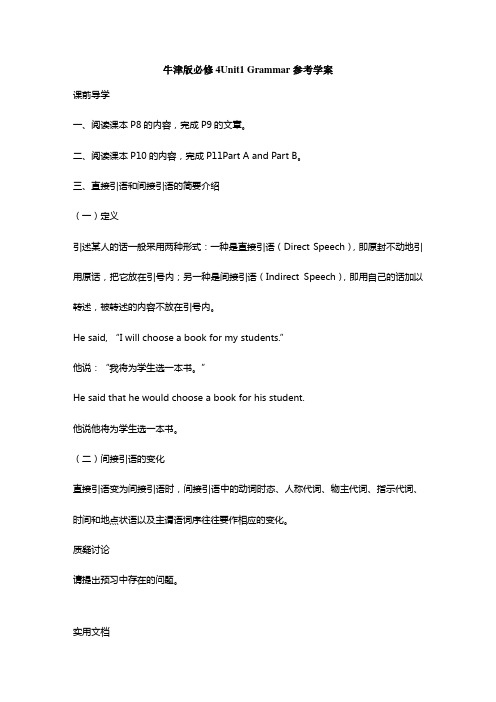
牛津版必修4Unit1 Grammar参考学案课前导学一、阅读课本P8的内容,完成P9的文章。
二、阅读课本P10的内容,完成P11Part A and Part B。
三、直接引语和间接引语的简要介绍(一)定义引述某人的话一般采用两种形式:一种是直接引语(Direct Speech),即原封不动地引用原话,把它放在引号内;另一种是间接引语(Indirect Speech),即用自己的话加以转述,被转述的内容不放在引号内。
He said, “I will choose a book for my students.”他说:“我将为学生选一本书。
”He said that he would choose a book for his student.他说他将为学生选一本书。
(二)间接引语的变化直接引语变为间接引语时,间接引语中的动词时态、人称代词、物主代词、指示代词、时间和地点状语以及主谓语词序往往要作相应的变化。
质疑讨论请提出预习中存在的问题。
实用文档拓展延伸看下面的讲解,思考并完成下面的填空。
(一)间接引语中的词语变化1. 标点符号的变化:He said to me, “Don’t buy it!” = He told me not to buy it.2. 语序的变化:疑问语序变为陈述语序。
He said to me, “Do you live in London?”= He asked me if/whether I lived in London.3. 动词的变化:say (to)在陈述句中多变为tell等词,在疑问句中多变为ask等词,在祈使句中表示命令多变为tell, order等词,表请求时多变为ask等词。
He said to me, “Could you please live in London?”= He asked me if/whether I could live in London. = He asked me to live in London.4.时态的变化(1) 如果主句中的谓语动词是一般现在时态,间接引语中的动词时态保持不变。
- 1、下载文档前请自行甄别文档内容的完整性,平台不提供额外的编辑、内容补充、找答案等附加服务。
- 2、"仅部分预览"的文档,不可在线预览部分如存在完整性等问题,可反馈申请退款(可完整预览的文档不适用该条件!)。
- 3、如文档侵犯您的权益,请联系客服反馈,我们会尽快为您处理(人工客服工作时间:9:00-18:30)。
M4U1 Grammardirect speech and indirect speech直接引语和间接引语引述别人的原话叫直接引语,用自己的话转述别人的话叫间接引语。
这两种引语都是宾语从句,但直接引语在引号内,不用连词联接;间接引语不用引号,通常用连接词联接主句。
A.陈述句直接引语如果是陈述句,变为间接引语时,用连词that引导(that在口语中常省略),从句中的人称、时态、指示代词、时间状语、地点状语等要作相应变化。
(1)人称的变化(2)时态的变化如主句的谓语动词是一般过去时,直接引语变间接引语时,从句的谓语动词在时态方面要作相应的变化。
如主句的谓语动词是现在时,从句的时态则无需变化。
直接引语转换成间接引语时时态的变化:一般现在时→一般过去时现在进行时→过去进行时一般过去时→过去完成时现在完成时→过去完成时一般将来时→过去将来时过去完成时→过去完成时补充:间接引语中的不变时态如下。
在把直接引语变成间接引语时,谓语动词的时态一般要作相应的变化,但在下列几种情况下时态不变。
①如果间接引语主句中的动词是一般现在时,现在进行时,现在完成时或将来时态时。
如:He says,“This work is too difficult.”→____________________________.②当直接引语是表示不因说话时间变化而变化的科学真理或客观事实时。
如:He said,“There are over 50,000 different characters in Chinese.”→He said____________________________.③当直接引语动词表示的状态或动作在引述时仍在继续时。
如:“I’m fifteen,”the boy said.→The boy____________________________.④当直接引语中的谓语动词含有无过去时形式的情态动词时。
如:I said,“You’d better ask him for help.”→I said____________________________.⑤当直接引语陈述的是一种反复出现或习惯性的动作时。
如:“I get up at six o’clock every morning.”said he.→He said____________________________.⑥时间状语从句中的一般过去时或过去进行时,变成间接引语后可以不变。
如:“When I lived in America, I often saw Tom,”said he.→He said ____________________________.⑦如果直接引语中有明确的过去时间状语时。
如:“I was born in 1982,”said my friend.→My friend said____________________________.⑧当直接引语中的谓语动词为过去完成时的时候。
如:“I had lived in a small village before I came here,”said she.→She said ____________________________.(3)指示代词、时间状语、地点状语和动词的变化。
直接引语转换成间接引语时的变化this→that 这个→那个these→those 这些→那些now→then 现在→那时today→that day 今天→那在yesterday→the day before 昨天→前一天tomorrow→the next(following)day 明天→第二天ago →beforehere →there 这里→那里come→go来→去补充:如果在当地转述,here不必改为there,动词come不必改为go。
如果在当天转述,yesterday, tomorrow等时间状语也不必改变。
B.疑问句疑问句改为间接引语后,不再是独立的疑问句,而是陈述句的宾语从句。
所以原有疑问句的倒装语序必须改为陈述句的正常语序,句尾不用问号而用句号。
(1)一般疑问句改为间接引语时,从句用if或whether引导。
例如:“Are you ready?”he asked. →He asked me____________________.(2)特殊疑问句改为间接引语时,从句仍用原句中的疑问词引导。
例如:“What did you say?”he asked. →He asked me________________.(3)选择疑问句改为间接引语时,从句通常用whether引导。
例如:He said,“Are they teachers or students?”→He asked me ____________________________.(4)陈述疑问句改为间接引语时也用if或whether引导。
例如:He said, “You are a student?”→He asked me whether/if I was a student.(5)祈使疑问句和祈使句一样,改为asked加宾语再加不定式短语(宾语补足语)。
例如:He said to me,“Will you do me a favor?”→He asked me to do him a favor.C.祈使句(1)转述祈使句时,要将祈使句的动词原形变为带to的不定式,并在不定式的前面根据句子的意思加上advise, ask, beg, invite, order, remind, tell, warn等。
例如:He said to me.“Speak louder.”→He asked / told me to speak louder.(2)引述动词的间接宾语或直接引语中的呼语是祈使的对象,通常改为引述动词的宾语。
如原句没有间接宾语或呼语,通常也要加上宾语me, him, us等。
Practice:一、将所给直接引语变为间接引语,每空一词:1. “I am having supper,” he said.He said that _______ _______ having supper.2. “I’ve seen the film,” Gina said to me.Gina _______ me that she _______ _______ the film.3. “I went home with my sister,” she said.She said that _______ _______ _______ home with her sister.4. The teacher said, “The sun is bigger than the moon.”The teacher said that the sun _______ bigger than the moon.5. “I met her yesterday,” he said to me.He told me that he _______ met her the day _______.6. “You must come here before five,” he said.He said that I _______ to go _______ before five.第 2 页共4 页7. “I bought the computer two weeks ago,” she said.She said that she _______ bought the computer two weeks _______.8. “Did you read the book last week?” he said.He _______ _______ I had read the book the week _______.9. He said, “You can sit here, Jim.”He _______ Jim that he _______ sit there10. He asked, “How did you find it, mother?”He asked her mother _______ _______ _______ found it.11. “Where have you been these days?” he asked.He asked me _______ _______ _______ been _______ days.12 “Do you know where she lives?” he asked.He asked _______ _______ knew where she _______.13. “Keep quiet, children.” he said.He _______ the children _______ _______ quiet.14. “Don’t look out of the window,” she said.She told me _______ _______ _______ out of the window.15. “Are you interested in this?” he said.16.He _______ _______ I was interested in _______.二.选择题1、He always thinks of _____ he can do more for the people.A. whatB. howC. ifD. whatever2、The problem is _________he has enough time.A. ifB. whetherC.×D. that3、We don’ t doubt _______ he can do a good job.A. whetherB. thatC. howD. why4、He asked me _______to build this plant.A. how long it was takenB. how long it had takenC. how much time did it takeD. how much time it was taken5、She had demanded to know _____ the child was.A. thatB. whichC. whoseD. whom6、Can you make sure _____ the gold ring?A. where Alice had putB. where had Alice putC. where Alice has putD. where has Alice put7、Please explain_____ this is impossible.A. howB. whatC. whyD. that8、No one can tell _____ will happen next.A. whatB. whenC. whereD. which9、—Do you remember _____ he came? —Yes, I do. He came by car.A. howB. whenC. thatD. if10、Living things are dying out quickly. First, we should ask _____destroying them in the past years.A. what part people have been playingB. what part have people played inC. what part people have played inD. people have been played what part11、Some college students are seen doing _____ work they can find to support themselves.A. thatB. whichC. whateverD. no matter what12、_____ it has been raining heavily those days will of course do harm to our crops.A. ThatB. WhetherC. HowD. If13、—What did she want to know, Tom?—She wondered _____ we could complete the experiment.A. when was itB. it was when thatC. it was whenD. when it was that14、The shopkeeper did not want to sell for_______ he thought was not enough.A. whereB. howC. whatD. which三、把下面的直接引语变为间接引语。
